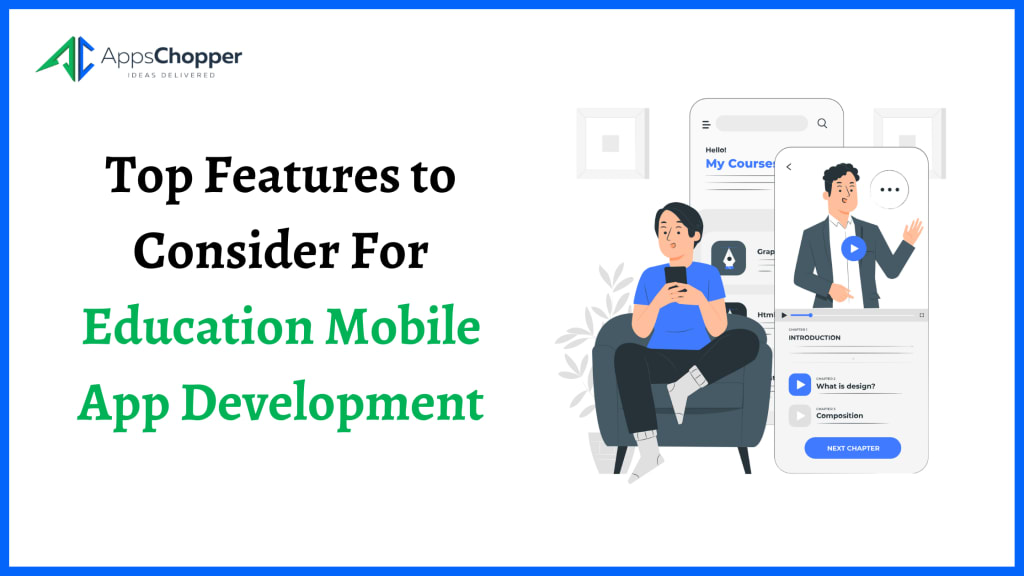Top Features to Consider For Education Mobile App Development
Education Mobile App Development

Education has evolved by leaps and bounds in recent years, thanks to the increased adoption of mobile learning apps! Mobile applications have indeed become indispensable tools in the educational landscape, empowering students, teachers, and parents alike.
Education mobile apps have clearly transformed the way we learn and acquire knowledge. They have been useful in many ways, making learning more accessible, interactive, and personalized.
However, incorporating the right features into your education mobile app can significantly engage students and foster effective learning environments. This is true regardless of whether you are an educational institution, an edtech startup, or an individual educator. In fact, several crucial features can enhance the learning experience and improve educational outcomes regarding education mobile app development services.
In this blog, we will explore the top features you’ll need to consider if you plan to develop an educational mobile app.
Education Mobile App Development Features You Cannot Do Without
- User-Friendly Interface
A user-friendly interface is crucial for any mobile app, especially in education. Your application requires an intuitive design and navigation so students, teachers, and parents can use it easily.
A clean and organized interface helps users find the desired information quickly, enhancing the overall user experience.
- Personalization and Customization
Personalization is a key feature in education mobile apps. Apps built strategically through professional education app development services can cater to individual students' strengths and weaknesses by offering personalized content, recommendations, and learning paths.
Customization options for themes, fonts, and layouts can also make the learning experience more enjoyable and engaging.
- Gamification and Interactive Learning
Integrating gamification elements and interactive learning features into an education mobile app can significantly enhance student engagement. Gamification techniques like badges, rewards, leaderboards, and virtual currencies can motivate students to participate actively in their learning journey. You can offer quizzes, puzzles, and other fun, interactive learning activities on your app to ensure users enjoy and remember what they learn.
- Content Management System
A robust content management system (CMS) allows educators to seamlessly create, manage, and update educational content. It should support various content formats like text, images, videos, and interactive multimedia.
Easy content creation and maintenance streamline the process of delivering up-to-date and relevant learning materials to students. You can learn more about incorporating a content management system into your edTech app in this guide on education app development.
- Push Notifications and Alerts
Push notifications and alerts inform students, teachers, and parents about important updates, announcements, deadlines, and events. These notifications serve as reminders of upcoming assignments, class schedules, and school activities. Push notifications keep users connected and engaged, fostering a sense of accountability and timeliness.
- Offline Accessibility
Offline access means students can access educational content, lectures, and resources, regardless of internet availability, once they download the content to their devices. This feature ensures uninterrupted access to learning materials, regardless of the user's location or network availability.
- Integration with Learning Management Systems (LMS)
LMS integration enables seamless synchronization of data, such as grades, assignments, and course progress, between the app and the educational institution's existing infrastructure. It allows educators to leverage the power of an established LMS while providing students with a unified learning experience across different platforms.
- Security and Privacy Measures
When developing an education mobile app, prioritizing security and privacy is paramount. The app should adhere to industry-standard security protocols, protecting sensitive user data from unauthorized access or breaches. Implementing secure authentication mechanisms, encrypted data transmission, and strict data privacy policies instills trust among users.
- Analytics and Reporting
Analytics and reporting features provide valuable insights into students' learning progress and app usage patterns. By tracking user interactions, engagement metrics, and performance indicators, educators can gain actionable data to assess their teaching methodologies' effectiveness and identify improvement areas.
Analytics also enable personalized feedback and recommendations, further enhancing the learning experience.
- In-App Messaging and Communication
In-app messaging and communication features enable seamless communication between students, teachers, and parents within the education app. Instant messaging, announcement boards, and chat functionalities facilitate real-time interactions, allowing users to ask questions, seek clarifications, and receive prompt responses.
Effective communication channels promote efficient collaboration, provide timely support, and foster stronger teacher-student and parent-school relationships.
- Parental Control and Monitoring
Education mobile apps can offer these features to give parents visibility into their child's learning progress and activities. Parents can track performance, view assignments and grades, and receive updates on their child's educational journey.
Parental involvement through the app strengthens the home-school connection and encourages active parental support in the learning process.
- Cross-Platform Compatibility
Users shouldn't have to worry if the app will work on their devices. Cross-platform compatibility allows users to access the app from their preferred devices. This flexibility enhances the user experience and eliminates barriers to accessing educational resources. Compatibility with multiple platforms and devices will also maximize accessibility and help you reach a wider audience.
Conclusion
Education mobile app development offers tremendous potential to revolutionize our learning and teaching.
Your education app will be unbeatable if you incorporate the top features discussed above. These include user-friendly interfaces, personalization, gamification, content management systems, push notifications, and more. Several reputed education mobile app development service providers can create engaging, interactive, and effective learning experiences for users of all age groups and categories.
Don't miss out on the transformative power of education mobile apps. Embrace these features and embark on a journey to unlock the full potential of digital learning.
About the Creator
Enjoyed the story? Support the Creator.
Subscribe for free to receive all their stories in your feed. You could also pledge your support or give them a one-off tip, letting them know you appreciate their work.





Comments
There are no comments for this story
Be the first to respond and start the conversation.